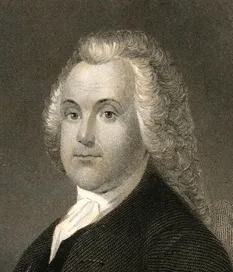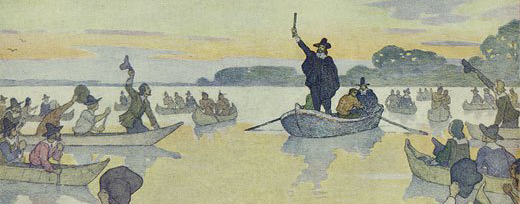In October 1635, five years after arriving in the Massachusetts Bay Colony, Puritan Separatist minister Roger Williams was brought before the colony’s General Court, charged with insisting that magistrates stay out of church affairs; that Native Americans were the real owners of the land and should be appropriately compensated; that the phrase “so help me God” should be eliminated from legal oaths taken by non-Christians, and other critiques of both church and state.

Bill Leonard
The court ruled: “Whereas Mr. Roger Williams, one of the elders of the church at Salem, hath broached & divulged diverse new & dangerous opinions,” thus undermining governmental and ecclesial authority, “it is therefore ordered that the said Mr. Williams shall depart out of this jurisdiction within six weeks.”
Seventeenth century Christian nationalism exiled Williams into the “howling wilderness” of New England. Saved by the Narragansetts, he purchased land from them, founding Providence as “a shelter for persons distressed of conscience” in what became Rhode Island, the first colony to grant complete religious freedom. Now, 389 years later, if Roger Williams should miraculously appear, would today’s Christian nationalists exile him again lest his profound vision of religious liberty again prevail?
The modern situation
These days, while everybody talkin’ about Christian nationalism ain’t a-going there (a massive PRRI survey suggests three in 10 Americans are adherents or sympathetic to the idea), it may be only one election away. The movement is closely connected to a political party and a presidential candidate already working to implement its agenda. We ignore Christian nationalism and Roger Williams’ response to it at our peril.
“We ignore Christian nationalism and Roger Williams’ response to it at our peril.”
Christian nationalism, so-called and much discussed, went center stage last month when the Alabama state Supreme Court declared frozen embryos are “extrauterine children,” a ruling compounded when Tom Parker, the chief justice, opined that, “Even before birth, all human beings bear the image of God, and their lives cannot be destroyed without effacing his glory.” He insisted human life “cannot be wrongfully destroyed without incurring the wrath of a holy God, who views the destruction of his image as an affront to himself.”
In a podcast with Johnny Enlow, evangelical preacher, Q-Anon advocate and self-acknowledged prophet, Judge Parker called Christian nationalism “an undefined term that’s being thrown around now to label people, and I have no idea what they mean by or what should be meant by it.” Yet he asserted the Bible constituted America’s “original form of government.” He contended: “It’s constitutional. It’s our foundation.”
A Christian nationalist by any other name would …
Seven Mountains Dominionism
In multiple interviews, Parker affirmed his commitment to the “Seven Mountain Mandate” a dominionistic Pentecostal/charismatic-generated movement that advocates inculcating fundamentalist dogmas into American laws, politics and culture, through Christian dominance of government, education, media, religion, family, business and entertainment. The mandate promotes America as a country in which Christianity should be the nation’s primary (and privileged) religious tradition, its conservative principles the law of the land, and its lawmakers solidly in control.
The Seven Mountain approach includes an emphasis on the role of “prophets” said to receive revelatory communication from the divine, including certain directives to be politically levied upon Christians and non-Christians alike.
Enlow prophesied Donald Trump’s election in 2020, but after Joe Biden’s victory he reported receiving a prophetic “vision” of Trump holding a “golden scepter” and wearing a “golden crown” as proof of the candidate’s divine anointing.
That revelation led Enlow to conclude: “Heaven does not recognize (Biden) having any scepter nor wearing any crown. From heaven’s perspective, there is only the legitimacy of (Trump). God has assigned a massive contingency of angels to that scepter and to that crown.”
When petitioned by 85 ministers to apologize for his mistaken prophecy, Enlow responded: “Those who refuse to (agree) with God, must now be pressured into accepting the (election] steal, under the guise of ‘being humble enough’ to admit being wrong. How about ‘being humble enough’ to keep agreeing with God after even believers and fellow leaders push for abandoning what he has clearly revealed?”
“In this brand of Christian nationalism, if you lose an election, simply say it was stolen and then have a vision in which God agrees with you.”
In this brand of Christian nationalism, if you lose an election, simply say it was stolen and then have a vision in which God agrees with you. They were bound to happen, times when biblical inerrancy morphed into prophetic inerrancy through claims of direct inspiration visited upon certain anointed exegetists. In Christian history, it doesn’t take long before the inerrant word mutates into inerrant interpreters.
Remember Roger Williams
That kind of 21st-century Christian nationalism alone compels us to recover the witness of Roger Williams who, like few other Americans of his time, understood the nature of religious liberty inseparably linked to freedom of conscience.

Roger Williams
I’m ever awed by his insights and courage, especially since he was surrounded by Christian establishmentarians at every turn. Their contemporary religio-political counterparts represent a similar challenge to the profound vision of religious liberty Williams set in motion.
Christian nationalism in multiple forms and ideologies was present from the start, yet Williams’ views impacted the Constitution’s First Amendment and the religious pluralism that followed. However, the majority Christian population was implicitly/explicitly privileged, at least until now, when it numbers less than 50%, amid an ever-increasing body of religiously nonaffiliated citizens.
Public policy transitions regarding marriage, sexuality, racial diversity, public education, library books, political parties and social media are but a few of the challenges contributing to significant cultural realignments, especially in politics and religion. Christian nationalism’s resurgence is related to divisions in church and government, with conflicting interpretations of Constitution and Bible alike.
I’ve referenced Roger Williams often in this space and continue to do so because he is an important guide for linking one set of American origins and ideals with the socio-theological endangerments of the present moment. Recent church-state events sent me back to the preface of perhaps his most important book, The Bloudy Tenent of Persecution for the Cause of Conscience, 1644, republished in 2004 by Mercer University Press.
In that book, Williams’ response to religious liberty and statecraft become timeless admonitions for church and state in our own divisive, dangerous times. Consider these representative assertions with brief commentary, for our here and now:
- It is the will and command of God that, since the coming of his Son the Lord Jesus, a permission of the most Paganish, Jewish, Turkish, or anti-christian consciences and worships be granted to all men in all nations and countries: and they are only to be fought against with that sword which is only, in soul matters, able to conquer: to wit, the sword of God’s Spirit, the word of God.
The incarnation of Jesus Christ is the very foundation of religious liberty, a freedom for uncoerced faith or unbelief.
- The state of the (Old Testament) land of Israel, the kings and people thereof, in peace and war, is proved figurative and ceremonial, and no pattern nor precedent for any kingdom or civil state in the world to follow.
For Williams, ancient Israel was no model for later nations to emulate, although Christian nationalists do, then and now.
- God requireth not an uniformity of religion to be enacted and enforced in any civil state; which enforced uniformity, sooner or later, is the greatest occasion of civil war, ravishing of conscience, persecution of Christ Jesus in his servants, and of the hypocrisy and destruction of millions of souls.
For Williams, “uniformity of religion” is the stuff of which inquisitions are made, inside and outside the church.
- An enforced uniformity of religion throughout a nation or civil state, confounds the civil and religious, denies the principles of Christianity and civility, and that Jesus Christ is come in the flesh.
Williams’ Christian faith convinced him that “enforced uniformity of religion” was incompatible with the gospel of Jesus.
- True civility and Christianity may both flourish in a state or kingdom, notwithstanding the permission of divers and contrary consciences, either of Jew or Gentile.
For Williams, “persecution for cause of conscience,” however it might be configured, was the most “heretical, blasphemous, seditious and dangerous” action a state, church or individual could take.
Americans should take that to heart, while we still can.
Bill Leonard is founding dean and the James and Marilyn Dunn professor of Baptist studies and church history emeritus at Wake Forest University School of Divinity in Winston-Salem, N.C. He is the author or editor of 25 books. A native Texan, he lives in Winston-Salem with his wife, Candyce, and their daughter, Stephanie.
Related articles:
Christian nationalists are misguided Christians, Anthea Butler says
The Christian case for democracy | Analysis by Mark Wingfield
The threat of Christian nationalism in all 50 states, illustrated in eight charts | Analysis by Robert P. Jones
Roger Williams, the father of American deconstruction | Opinion by Alan Bean

